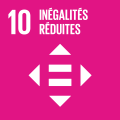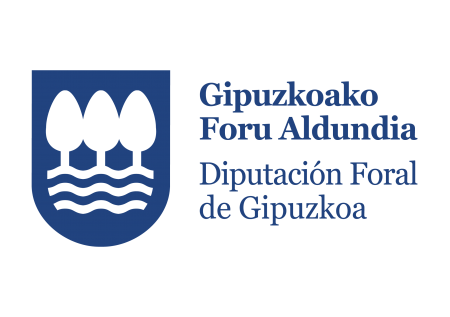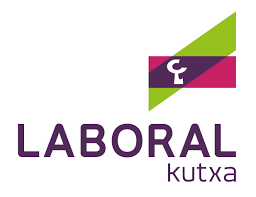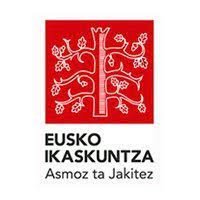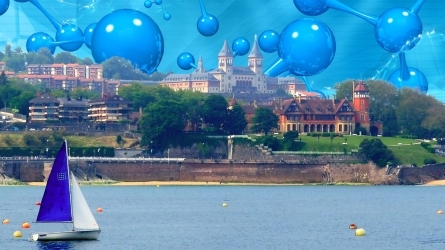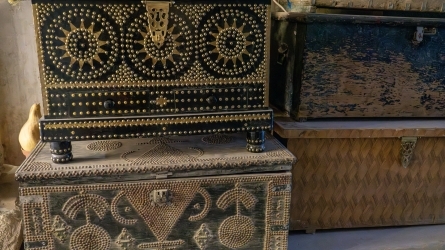
Radio and Television in Europe 2030 and Basque RTV 40
Description
This one-day-Summer Course will offer (1) a reflection on the convergence, transformation, and impact on society of the audiovisual media (radio, TV, and the Internet) in Europe with the perspective of the year 2030; (2) a discussion of current and future challenges and strategies that European minority language radio and television are confronting and carrying out to fulfill their public service responsibilities; and (3) acknowledgment of the past, present and future relevance of the Basque Radio and Television EITB as a public service, complemented with an act of recognition for the 40th anniversary in 2022, extended to Welsh language television S4C (Sianel Pedwar Cymru).
This course, addressed to media professionals and students, has a two-fold profile: Professional, with European experts and minority language radio and television executives; and scholar, with the contribution of communication and journalism professors from the universities of the Basque Autonomous Community and Navarre.
Objectives
To reflection on the convergence, transformation, and impact on society of the audiovisual media (radio, TV, and the Internet) in Europe with the perspective of the year 2030.
A discussion of current and future challenges and strategies that European minority language radio and television are confronting and carrying out to fulfill their public service responsibilities.
Acknowledgment of the relevance of the Basque Radio and Television EITB and Welsh language television S4C (Sianel Pedwar Cymru)in their 40th anniversary in 2022.
Activity directed to
- University student
- Teachers
- Professionals
- All public
Methodology
- Cooperative: Speakers share reflections and contributions from different cultural perspectives seeking a common ground on major issues.
- Integrative: directors of radio and television outlets in European minority languages, on the one hand, and scholars from the universities of the Basque Country and Navarre, on the other, participate as an integrated team in diversity.
Contributors
Program
22-07-2022
Institutional Opening session. Speaking order:
- Itziar Alkorta Idiakez | UPV/EHUko Uda Ikastaroak Fundazioa - Zuzendaria akademikoa / Directora académica
- Markel Olano Arrese | Gipuzkoako Foru Aldundia - Gipuzkoako Diputatu Nagusia
Presentation by the Director of the activity
- Iñaki Zabaleta Urkiola | UPV/EHU - HEKA proiektuko zuzendaria / Director proyecto HEKA
“Irrati, telebista eta Internet Europan 2030: gai eta ikuspegi nagusiak konbergentzia, eraldaketa, eta gizarte-inpaktuaren inguruan / Radio, TV e Internet en Europa 2030: principales cuestiones y perspectivas en torno a la convergencia, transformación y valores sociales“
- Giuseppe Abbamonte | Europar Batasuneko “Media Policy” / "Media Policy" de la Unión Europea - Zuzendaria / Director
Break
Round table: “Irrati, telebista eta Internet europar hizkuntz gutxituetan 2030ra begira: erronkak eta estrategiak ikuspegi askotako arrakasta, irismen eta zerbitzu publikoaren kontzeptuaren aurrean / Radio, televisión e Internet en lenguas minoritarias europeas en 2030: desafíos y estrategias para un concepto multilateral de éxito, alcance y servicio público“
- Tania Arriaga Azkarate | UPV/EHU - ikus-entzunezko irakaslea / Profesora de comunicación audiovisual (Moderator)
- Unai Iparragirre Torres | Euskal Telebista ETB - Zuzendaria / Director
- Siân Doyle | Galesezko S4C telebista / Televisión en lengua galesa S4C (Sianel Pedwar Cymru) - Zuzendari Exekutiboa / Director Ejecutivo (Participation by zoom)
- Alan Esslemont | Irlanderazko TG4 telebista / TV en idioma irlandés TG4 (TG Ceathair) - Zuzendari Nagusia / Director General
- Daniel Hernández i Torrent | Oficina de Estrategia y Consejo de Gobierno de la CCMA - Director
- Alfonso Sánchez Izquierdo | Corporación RTV de Galicia CRTVG - Zuzendari Nagusia / Director General
“Euskal kultura, gizarte aniztasuna eta EITB Euskal Irrati Telebista: elkarrekintza indargarria / Cultura vasca, diversidad social y Radio Televisión Vasca EITB: interacción fortalecedora“
- Ana Urkiza Ibaibarriaga | Eusko Ikaskuntza - Presidentea / Presidenta
Break
Round table: “Irrati eta telebista lineal eta ez-linealeko edukiak eta zerbitzuak audientziaren dispertsioari aurre egiteko: unibertsitateko ikuspegia elkarrekintza, esfera publiko eta gizarte hobe baterako / Contenidos y servicios en radio y televisión lineal y no lineal para afrontar la dispersión de la audiencia: una perspectiva académica para una mejor esfera pública, sociedad y democracia“
- Izaskun Rodríguez Rodríguez | UPV/EHU - Irakaslea / Profesora (Moderator)
- Idoia Astigarraga Agirre | Mondragon Unibertsitatea / Universidad de Mondragón - Irakaslea / Profesora
- Ana Azurmendi Adarraga | Nafarroako Unibertsitatea / Universidad de Navarra - Irakaslea / Profesora
- Irati Agirreazkuenaga Onaindia | UPV/EHU
- Ion Muñoa Errasti | Deustuko Unibertsitatea / Universidad de Deusto - Irakaslea / Profesor
Break
“1982-2022, EITB Euskal Irrati Telebistaren lehena, oraina eta etorkizuna: 40 urtez euskal gizartea zerbitzatzen / 1982-2022, pasado, presente y futuro de la Radio Televisión Vasca EITB: sirviendo a la sociedad vasca durante 40 años“
- Andoni Aldekoa | EITB Euskal Irrati Telebista - Zuzendari Nagusia / Director General
Round table: “Gogoeta eta eskertza 40. urteurrenean Euskal Irrati Telebista EITBri eta galesezko S4C telebistari (Sianel Pedwar Cymru) / Reflexión y agradecimiento en el 40º aniversario de la Radio Televisión Vasca (EITB) y la televisión en lengua galesa S4C (Sianel Pedwar Cymru)“
- Iñaki Zabaleta Urkiola | UPV/EHU - HEKA proiektuko zuzendaria / Director proyecto HEKA (Moderator)
- Ana Urkiza Ibaibarriaga | Eusko Ikaskuntza - Presidentea / Presidenta
- Marian Fernández Pascal | IBAIA, Entzunezkoen Euskal Ekoizle Burujabeen Elkartea / IBAIA, Asociación de Productoras Audiovisuales Independientes del País Vasco - Presidentea / Presidenta
- Giuseppe Abbamonte | Europar Batasuneko “Media Policy” / "Media Policy" de la Unión Europea - Zuzendaria / Director
- Francisco Moreno | Irrati eta Telebista Autonomikoen Federazioa /Federación de Organismos de Radio y Televisión Autonómicos) - Presidentea/presidente
Closing session
- Iñaki Zabaleta Urkiola | UPV/EHU - HEKA proiektuko zuzendaria / Director proyecto HEKA
Harrera Donostiako Udaletxean. Recepción en el Ayuntamiento de Donostia / San Sebastián
Directors

Iñaki Zabaleta Urkiola
UPV-EHU
Iñaki Zabaleta is a professor of journalism at the University of the Basque Country UPV-EHU, director of the research project "European Minority Language Media and Journalism" (since 2001), and general secretary of the Society of Basque Studies-Eusko Ikaskuntza. After conducting his doctoral dissertation and taking doctoral courses at the Graduate Center of the City University of New York (CUNY), he obtained a Ph.D. in journalism at the UPV-EHU and a Master's of Science in television at Brooklyn College in New York (1985). He was a visiting professor at the University of Iowa (USA) in 1992. He has published numerous scholarly articles in prestigious international journals and books and papers on communication. As a professional journalist, he directed a series of television documentaries (1992), made feature stories for the CNN (1990), and was the director of the university magazine Munduan Paz y Desarrollo (1999-2007), within the Master's Degree in Cooperation and Development at the University of the Basque Country. ORCID: https://orcid.org/0000-0002-3050-2736
Speakers
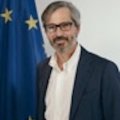
Giuseppe Abbamonte
Giuseppe Abbamonte has been the Director for Media Policy at the European Commission since 2016. His directorate is in charge of the copyright law, broadcasting law, the MEDIA programme, which provides financial support to the European audiovisual industry, and the fight against online disinformation. Before, he was in charge of the Directorate responsible for the elaboration of the European data strategy. He also worked for some years in the Antitrust and Consumer Protection departments of the European Commission. Before joining the Commission, Abbamonte was an associate in an international law firm in Milan for four years (1989/1992), where he dealt mainly with commercial law and competition law. He is the author of several publications mainly in English law magazines and he teaches media law to master students at the Università commerciale Luigi Bocconi and give lectures and presentations on European law at several European universities.

Irati Agirreazkuenaga Onaindia
Universidad del País Vasco-Euskal Herriko Unibertsitatea
Irati Agirreazkuenaga Onaindia holds a degree in audiovisual communication (UPV/EHU, 2008), master's degree in social communication (UPV/EHU, 2010) and a PhD in journalism (UPV/EHU, 2013) with an international thesis analysing minority languages and public media. She has done postdoctoral stays at the London School of Economics and Political Science (2015) and the Centre for Cultural Policy Research at the University of Glasgow (2014). She has worked for the Basque Public Television (Euskal Telebista) as a reporter (2015, 2017) and she’s currently lecturer in the Department of Journalism at the UPV/EHU. Her publications include the adaptation and use of Basque-laguage on radio (Media, Culture & Society), the politics and poetics of migrant narratives (European Journal of Cultural Studies), the communication strategies of radio stations created by migrant populations (Journal of Ethnic and Migration Studies; Handbook of Media and Migration) and participation in public media during the Scottish independence referendum (Social Sciences).

Andoni Aldekoa
He has been the director-general of the public Basque Broadcasting Corporation EITB (Euskal Irrati Telebista) since November 2020. Previously, he was an advisor to the Presidency of the Basque Government and director of Communication (2015-2017). He has also been president of the public companies PROMOBISA and Bilbao Next of the City Council of Bilbao for city promotion and development. He graduated in Radio and Television at the INDESCO Bilbao (1991-92). He got a Master's degree in Political and Electoral Communication at the Universidad Autónoma de Barcelona and a postgraduate degree in Economic Intelligence and Security at ICADE (2016). Likewise, he obtained the certificate in Management Standards under the rules of the EFQM, European Foundation for Quality of Management. He has taught Public Management at the George Washington University Graduate Program for Latin American programs. He has been a guest lecturer and speaker at university postgraduate and training courses on Public Management and Institutional Communication at INAP, FEMP, UNED, Universidad del País Vasco y Universidad de Deusto.

Tania Arriaga Azkarate
Tania Arriaga holds a double Ph.D. degree in Development Studies (Universidad del País Vasco, UPV/EHU) and Basque Studies (University of Nevada, Reno, USA), and a BA in Journalism from the Basque Country University (UPV/EHU). She is currently a lecturer in the Audiovisual Communication and Advertising Department at the Universidad del País Vasco and a member of the HEKA research group (European Minority Language Media and Journalism). Until 2010 she worked in radio and television. Her latest scholarly article is News Agenda in European Minority Language Online Media: Balanced Coverage, Limited World (Journalism Studies, 2022), with Iñaki Zabaleta and María Gorosarri.
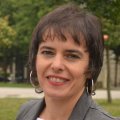
Idoia Astigarraga Agirre
Idoia Astigarra worked between 1996 and 2007 in Euskal Telebista as a producer and director of different programs; among the best-known programs are Wazemank, Goenkale, and Hitzetik Hortzera. Previously, she obtained a degree in Visual Image and Sound (Ciencias de la Imagen Visual y Auditiva) at the Universidad Complutense (Madrid) and an M.A. in Video from Middlesex University (London). In 2007 she started her Ph.D. studies at Mondragon Unibertsitatea and achieved her Ph.D. degree in 2017. Currently, she is a lecturer and researcher in the Audiovisual Communication degree at Mondragon Unibertsitatea, and she is this program´s coordinator. Her latest scholarly article is Youth interaction with television and online video content in the digital age, published by the Journal of Digital Media & Interaction (2018) together with I. Pavon and A. Zuberogoitia.

Ana Azurmendi Adarraga
Ana Azurmendi is a full professor of constitutional law, communication Law, and vice-dean of research at the School of Communication, Universidad de Navarra. Her research focuses on audiovisual communication policies and media for democracy. She has been a principal researcher in four research projects and an associate researcher in eight others. Funded by public institutions, part of them focused on audiovisual services, regulation, reform, and contribution to society. In addition, she has worked as a collaborating expert in the parliamentary commissions for the reform of audiovisual laws of the Parliament of Galicia (2010), the Senate of the Republic of Mexico (2014), and the Parliament of the Basque Country (2016). Among her publications can be mentioned the book Media Law in Spain (ed. Wolters Kluwer, 2018), and the articles The right to be forgotten for children and teenagers (Journal of Communication & Society, 2022) and Encuesta y análisis sobre satisfacción, uso y consumo de televisiones públicas en España: La brecha generacional (Revista Latina de Comunicación Social, 2019).

Siân Doyle
Sian Doyle is currently the CEO for S4C, the Welsh language television channel. She has had 25 years of experience in the retail and telecommunications business, latterly as Managing Director for TalkTalk Consumer business. She has worked internationally, spending seven years in the US and Canada working for Rogers and Comcast, the organisation parent company of Sky and NBC/Universal. In addition, she worked in the UK as Retail Director for Orange, EE, and BT and spent ten years at Asda/Walmart. She has extensive customer and digital experience and a track record in leading transformative retail strategies for major corporates, developing new retail offerings through digital and innovative store design. She is currently a Trustee for National Theatre Wales, an appointment she has held for the last two years.

Alan Esslemont
Alan Esslemont is currently the director-general of TG4 Ireland. Alan was born in Braemar in Scotland and holds a Master’s degree in French from Edinburgh University and a postgraduate Master’s in Business Administration (MBA) from the Open University (UK). After working in France, Switzerland, and the Isle of Skye, where he learned Scots Gaelic, Alan moved to Ireland in 1984 for a teaching position at University College Galway. Alan was appointed in 1995 to the senior management group of Teilifís na Gaeilge, which launched TnaG in October 1996. He was a founding board member and treasurer of the Irish Film and Television Academy (1997-2000) and played a crucial role in the successful re-launch of TnaG as TG4 in 1999. He was appointed Director of Television for TG4 in 2000. In December 2007, Alan returned to Scotland to help set up and successfully launch BBC ALBA. In October 2016, Alan returned to work in Ireland to undertake the chief executive role at TG4. In 2019 he was elected to Chair of the Celtic Media Festival.
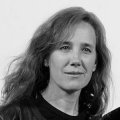
Marian Fernández Pascal
Marian Fernández Pascal is the founder of the audiovisual production company Txintxua Films and executive producer of all her works. She holds a degree in Audiovisual Communication from the Universidad of Navarra and a Film Certificate from New York University. She has collaborated as a teacher with the Elias Querejeta Zine Eskola of Tabakalera (Donostia-San Sebastian), the Faculty of Audiovisual Communication at the University of Mondragón, and Larrotxene (Donostia-San Sebastian). She currently chairs the Association of Basque Producers IBAIA and is a member of the Basque Council of Culture and the Council of Culture of Gipuzkoa.

Daniel Hernández i Torrent
Degree in Journalism from the Autonomous University of Barcelona and Postgraduate in Business Communication from Pompeu Fabra University. Director of the Cabinet and Institutional Relations of the Audiovisual Council of Catalonia from 2012 to 2022, where he has coordinated the Audiovisual White Paper (the strategic plan of the sector in Catalonia) and launched the communication education program in Catalan schools EduCAC. Previously he was the Director of Communication and Press of the Ministry of Culture and Media of the Generalitat de Catalunya (2006-2010), where he piloted the transition to DTT.

Unai Iparragirre Torres
Unai Iparragirre has been head of the Basque television channels ETB at the Basque Public Broadcasting Corporation EITB (Euskal Irrati Telebista) since 2021. Between 2005-2020 he worked in London at Discovery Communications, in the EMEA división for Europe, Middle East and Africa, holding high-level positions in different departments, being director of several TV channels for Europe and the Middle East, and vice-president of content strategies at EMEA. Before, between 2003-2004, he was producer and director of several televisión shows in the Basque ETB, as well as theatre actor at the Agerre Teatroa company. He holds degrees in Computer Science (1992-1998) and Drama and Theatre Studies (1993-1996) from the University of the Basque Country UPV-EHU. In addition, he has taken courses in Management Fundamentals (2008), GTD (2010), Digital Transformation (2016), and Strategic Problem Solving (2017), among others.
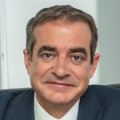
Francisco Moreno
Francisco Moreno is the administrator of the Public Entity Radio Televisión Canaria, a regional public channel integrated into FORTA (Federation of public Regional Radio and Television Corporations of Spain). He was the director of the Canarian Radio and Television between 2001-2005 and held senior management functions at RTVE, Antena 3, and the audiovisual division of Prensa Ibérica. He graduated in Journalism from the Universidad Complutense de Madrid. Lecturer of communication at the Next Business International School. He received the National Television Talent Award in 2009. He worked at Televisión Española (TVE) between 1987-1989. In 1990 he was appointed head of the Daily News Services of TVE in the Canary Islands and then Director of News and Programs, which he held until 1999.

Ion Muñoa Errasti
Deustuko Unibertsitatea
Ion Muñoa Errasti is an associate professor-researcher at the Faculty of Social and Human Sciences of Deusto University/Universidad de Deusto. He holds a degree in Humanities and Communication and a Ph.D. in Social Sciences. He is a lecturer on the degree of Communications and a member of the research team on communication. His main areas of interest are public communication, public opinion, and communication transformation.
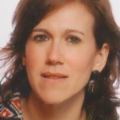
Izaskun Rodríguez Rodríguez
EHU-UPV
Izaskun Rodríguez Rodríguez is a lecturer in the Department of Journalism of the University of the Basque Country UPV-EHU since January 2019. She holds a degree in Journalism from the University of the Basque Country UPV-EHU since 1999, and studies of Advertising and Public Relations. She has developed her professional career as editor, production assistant and director of programs at the Basque television ETB for 20 years (1998-2018). Among her productions can be mentioned the reportage programs “Objetivo Euskadi” and “60 Minutos” and documentaries such as “Cooking at the summit” and “Scotland's decision”. She has also worked on cooking shows such as "No es País para Sosos" and directed the children's fiction "3 Txulo".
Ana Urkiza Ibaibarriaga
Ana Urkiza is currently the president of Eusko Ikaskuntza/Basque Studies Foundation, a centenary institution of the Basque Country. She holds a degree in Journalism, is an expert in Business Communication, and collaborates with various media. She has postgraduate degrees in commercial communication and banking, and human resources management. She has developed her professional career in the private and workers' cooperative sectors, more specifically, in the areas of communication and human Resources. Regarding institutional communication, she has been a lecturer at the University of Deusto, created and directed the Communication Classroom for professionals, and has been the coordinator of the Master's Degree in Communication EITB-Deusto. Her literary work in fiction and poetry is extensive. She has written books of poetry, short stories, biography, aphorisms, hyper-short stories, children's and young people's literature, and readers of interviews and essays on raw material and journalistic communication. She has been a member of the Basque Language Advisory Council for years.
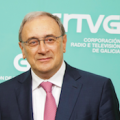
Alfonso Sánchez Izquierdo
Alfonso Sánchez Izquierdo has been director-general of the Galician Radio and Television Corporation (CRTVG) since 2009, and was president of the Federation of Regional Radio and TV Corporations FORTA (Federación de Organismos o Entidades de Radio y Televisión Autonómicos in 2009, 2015 and 2021. He holds degrees in Journalism and Law from the Complutense University of Madrid. From 1983 to 1987, he was director of the newspaper La Región de Ourense. In addition, he has served as director of the newspaper Atlántico Diario de Vigo and the Galician News Agency. He taught at the universities of Santiago de Compostela and Vigo. In 2008 he was appointed president of the Galician Association of Communication Management. He received the Diego Bernal Award 2005 from the Association of Journalists of Galicia. He is co-author of the book Social Dialogue in Galicia in 2008, a speaker at various universities and fórums, and president of the communication and media committee in the Galician Language Normalization Plan.
Registration fees
| Face-to-face | Until 22-07-2022 |
|---|---|
| 45,00 EUR | |
| 38,00 EUR | |
| 32,00 EUR | |
| 38,00 EUR | |
| 38,00 EUR |
| Live online | Until 22-07-2022 |
|---|---|
| 45,00 EUR | |
| 38,00 EUR | |
| 32,00 EUR | |
| 38,00 EUR | |
| 38,00 EUR |
Venue
Miramar Palace
Pº de Miraconcha nº 48. Donostia / San Sebastián
Gipuzkoa
Miramar Palace
Pº de Miraconcha nº 48. Donostia / San Sebastián
Gipuzkoa
Sustainable development goals
Agenda 2030 is the new international development agenda approved in September 2015 by the United Nations. This agenda aims to be an instrument to favour sustainable human development all over the planet, and its main pillars are the eradication of poverty, a reduction in equality and vulnerability and fostering sustainability. It is a unique opportunity to transform the world up to 2030 and guarantee human rights for all.

10 - Reduced inequalities
Reduce inequality in countries and between them. Key issues: promotion of the social, economic and political inclusion of all people, equal opportunities, fiscal, wage and social protection policies to favour equality, migration and the policies that affect it, official assistance for the development, regulation and supervision of world institutions and markets.
More information